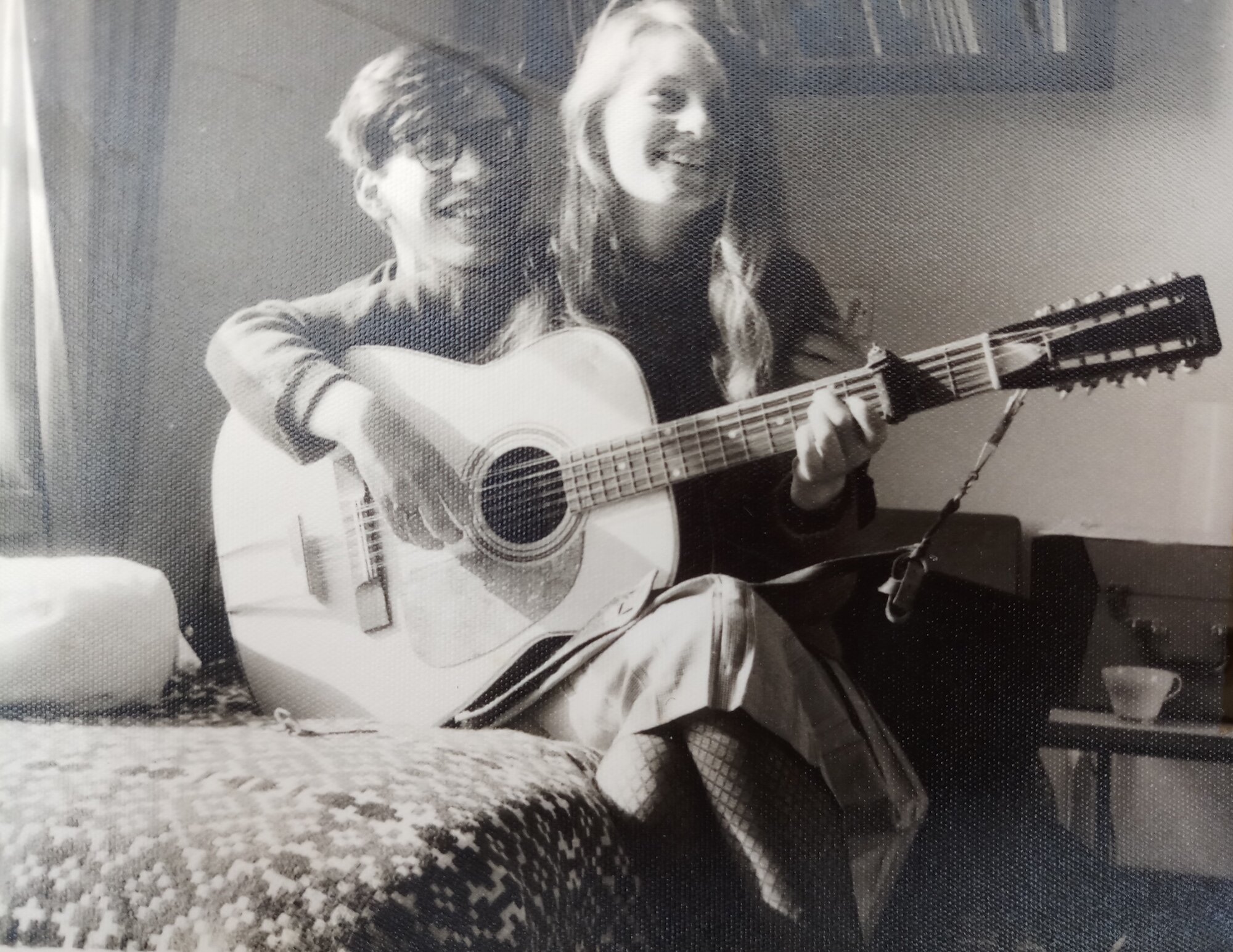BIOGRAPHY
Jehanne Mehta (née Sylvia Mathews in 1941) first started playing guitar at the age of 15 and bought her own Spanish guitar at the age of 17. Having taken a few lessons in flamenco guitar, she fell in love with folk music while a Modern Languages student at Keele University, where she sang in a student folk band The Keele Row with Dick Barton, Geoff Iliffe and Rob Mehta (whom she married a few years later when she was 24 and he 23). Together they ran the university folk club which was host to the early gigs of some major names such as Bert Jansch (who slept on Rob’s floor) and the young Martin Carthy. Carthy was a huge inspiration to Sylvia (as she was then known): listening to him she knew she had found the kind of music she wanted to sing. The Keele Row sang in folk clubs in Birmingham, Manchester, Liverpool and London (The Troubadour).
The story of her work from that time on is also the story of both a musical and life partnership with husband Rob (with whom she celebrated their 55th wedding anniversary in 2020). Both trained and worked as teachers but they played regular spots together at local folk clubs and other venues in Oxfordshire, she singing with guitar, accompanied by Rob on the fiddle or mandolin. After the birth of their first child in 1967 she wrote her first song. While Rob continued performing (with Banbury group The Poachers) during the 1970s and she would occasionally join him for a gig, it was not until they moved to Gloucestershire in 1979 with their 3 children (then 12, 7 and 5) that her songwriting became more of a dedicated focus and they began to find opportunities to play her original material.
Jehanne’s most prolific period came in the 1980s when she developed some of the interweaving themes which were to emerge strongly over the rest of her songwriting career: myth and legend, especially of place; the turning of the seasons; the inner journey of the soul; and a committed activism for nature. Jehanne and Rob played under the name Green Jack and recorded 4 albums, 3 of which are still available. Session musicians John Ralph and Bron Bradshaw joined them, as did Ric Sanders and Chris Leslie, both now well-known members of iconic folk collective Fairport Convention. (Chris, who plays on all of the 1980s recordings, took his first fiddle lessons from Rob in rural Oxfordshire, quickly becoming a prodigious teenage talent, clearly destined for the instrument.)
Jehanne also began writing songs in French at this time. She had felt a strong connection with the language since an extended French stay in her her late teens (in a household with a large world music collection) as well as with certain areas of France. She felt a particular affinity with the area sometimes termed “Cathar country” after the radical Christian sect that flourished in the south of France in the 13th century, an egalitarian and highly cultured group that allowed women to become initiates. This connection was strong enough to inspire an official name change to Jehanne, which is the old French version of Jean/Joan, and the description of her as a “troubadour” (the travelling court musicians/bards of that time) has been echoed from several quarters. Jehanne recalls she felt “immediately more at home in herself” with this name. Jehanne and Rob visited France most years in the 80s and early 90s.
In the early 90s came a new phase when a 3rd musician expanded their usual duo to a trio - this was Will Mercer, an exceptionally versatile guitarist, bass and mandolin player with whom they toured, performed and recorded for the next 25+ years under the name Earthwards. A major European tour in 1993 was a test of whether touring was the life they wanted to lead, but it exhausted Jehanne and took a considerable toll on her health. They decided to remain based in the Cotswold market town of Stroud with occasional shorter European tours (especially in Ireland, the Netherlands, France and Germany), and over many years continued to grow a small but dedicated international following. Recordings of Jehanne’s songs have reached Croatia, Spain, Russia, the US, Australia, South America and China. Many children have been brought up listening to them and the lyrics to some of the earlier ones can be found in Song Hunt, a collection published by Gatekeeper Trust in 1981 (see books in the SHOP).
Earthwards recorded 3 further albums. Rose in Deep Water (1992) exemplifies Jehanne’s mature style, with tracks combining folk, chanson, Spanish and jazz influences in a unique mix all her own. The much later Emblem (2006) and This Place (2015) signal more of a return to her folk roots and include tracks written many years before but never recorded. The themes she evolved throughout the 1980s, however, remain alive throughout.
Read more about Jehanne’s CREATIVITY






